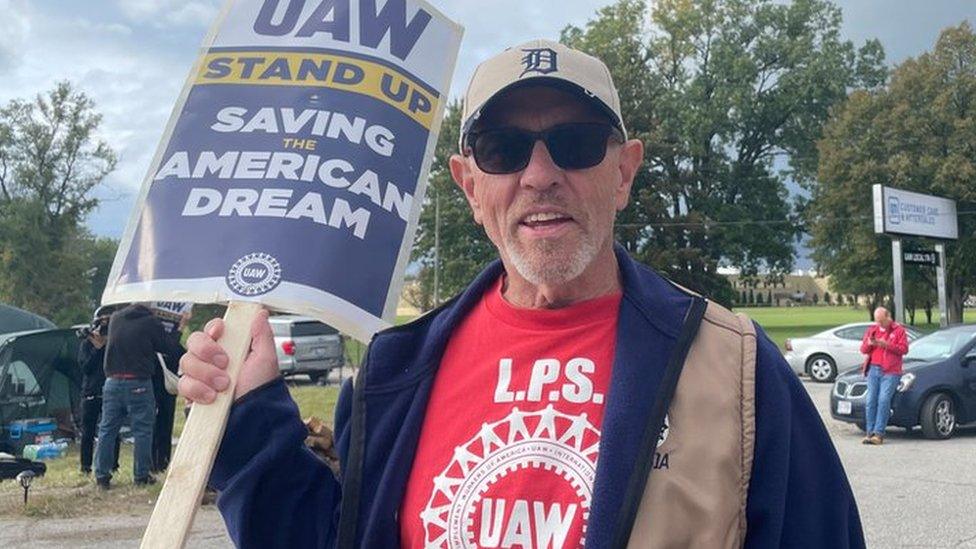Second Republican debate: Trump rivals spar in unruly debate
- Published
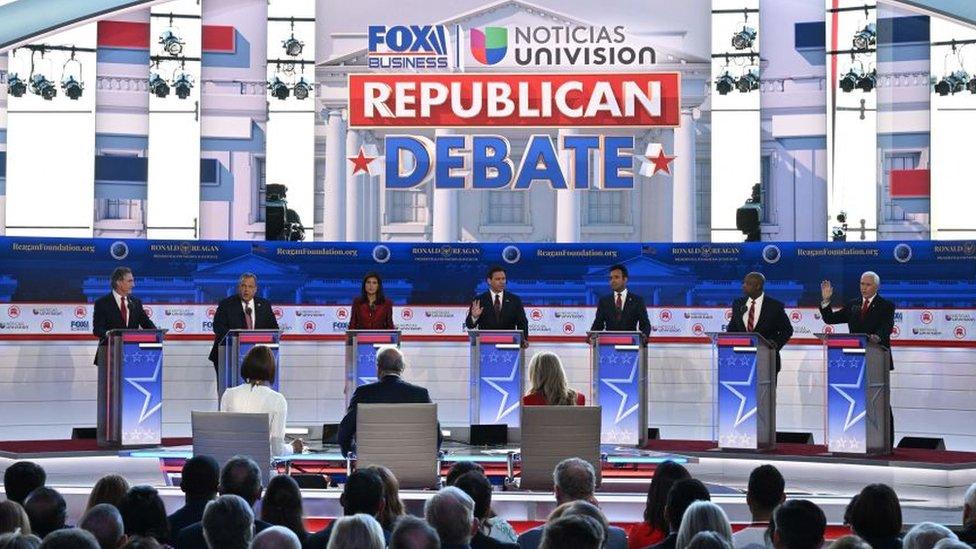
Seven Republican candidates tangled over the economy, immigration and China at the second 2024 presidential debate.
Frontrunner Donald Trump - who skipped the event to woo voters more than 2,000 miles (3,200km) away in Michigan - was branded "missing in action" by his nearest rival Ron DeSantis.
The contenders on stage also attacked each other during the increasingly heated two-hour forum on Wednesday.
But as the night ended, none had seized momentum with a standout moment.
The eventual Republican nominee will face President Joe Biden, the likely Democratic candidate, next year.
On stage for the Fox Business Network's primetime showdown were Florida Governor Ron DeSantis, biotech entrepreneur Vivek Ramaswamy, former UN Ambassador Nikki Haley, former New Jersey Governor Chris Christie, former Vice-President Mike Pence, South Carolina Senator Tim Scott, and North Dakota Governor Doug Burgum.
Polite exchanges marked the first half hour of the debate at the Ronald Reagan Presidential Library in Simi Valley, California - but it grew ill-mannered as the night wore on, with the three moderators losing control several times.
Mr Trump leads the Republican field by about 40 points in most opinion polls and had long indicated he would skip the debates.
Unlike in the first debate, Mr DeSantis - who is polling in a very distant second place - directly criticised the former president in his most aggressive effort so far to lure away Mr Trump's loyal supporters.
Twice calling out his fellow Floridian for being "missing in action", he touted a record of enacting conservative priorities as the state's governor, including an abortion ban.
He added that Americans needed a president who could serve two terms, a reference to the fact Mr Trump cannot do so as a former occupant of the White House.
But Mr DeSantis declined the final question of the night about which candidates should leave the race, declaring it "disrespectful".
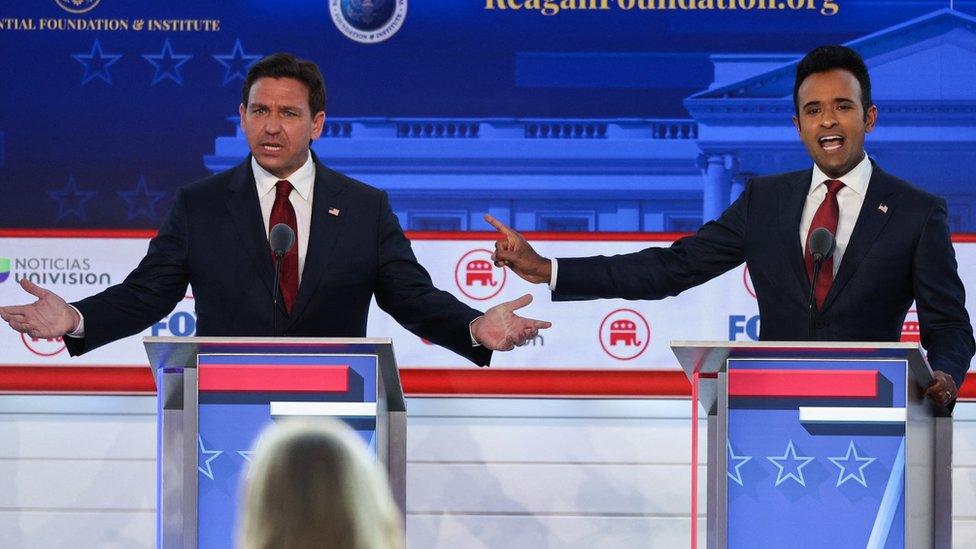
Mr Christie, an ally turned arch critic of the former president, did not feel the same. He labelled Mr Trump "Donald Duck", alleging he was too afraid to defend his record and had ducked the debates.
"This guy has not only divided our party, he's divided families and friends all over this country," he said of Mr Trump. "He needs to be voted off the island and he needs to be taken out of this process."
Immigration, and the influx of migrants and drugs across the US southern border, have been top concerns among Republican voters and came up periodically through the two-hour event.
Mr DeSantis vowed to treat Mexican drug cartels "as the foreign terrorists that they are", while Ms Haley said she "will send in our special operations and we will take out the cartels".
Such arguments, also heard at the first debate, have drawn strong criticism in Mexico, where many remain distrustful of US interventionism in domestic security affairs.
The future of US-China relations, and the perceived threat posed by the Asian superpower, also came under scrutiny by a largely hawkish field of candidates.
Mr DeSantis said "elites" in Washington had chosen to "surrender" to the Chinese Communist Party, while Mr Burgum attacked the Biden administration for a "policy of appeasement".
Mr Pence argued that President Biden's climate policies were only "good for Beijing" and Ms Haley lamented the flow of the deadly drug fentanyl from China to the US over the border with Mexico.
Several candidates piled on against Mr Ramaswamy, a biotech entrepreneur and political newcomer who has seen a polling bounce since the first debate.
The 38-year-old faced particularly harsh criticism from Ms Haley, who said: "Honestly every time I hear you, I feel a little bit dumber for what you say."
But Mr Ramaswamy held firm with highly unorthodox policy proposals, including forcefully asserting that being transgender was "a mental health disorder" and that children under the age of 16 should be barred from using "addictive" social media.
Another ex-businessman on the stage, the low-polling Mr Burgum, interrupted the forum on several occasions to argue it was time to "treat the taxpayer like a customer".
Mr Burgum also argued that he was the kind of "business leader" Republicans have been looking for and that, as North Dakota's chief executive, he had already done what his rivals had only proposed.
An hour earlier, Mr Trump had made a speech at an auto supplier in the Detroit suburbs, in which he barely mentioned his opponents.
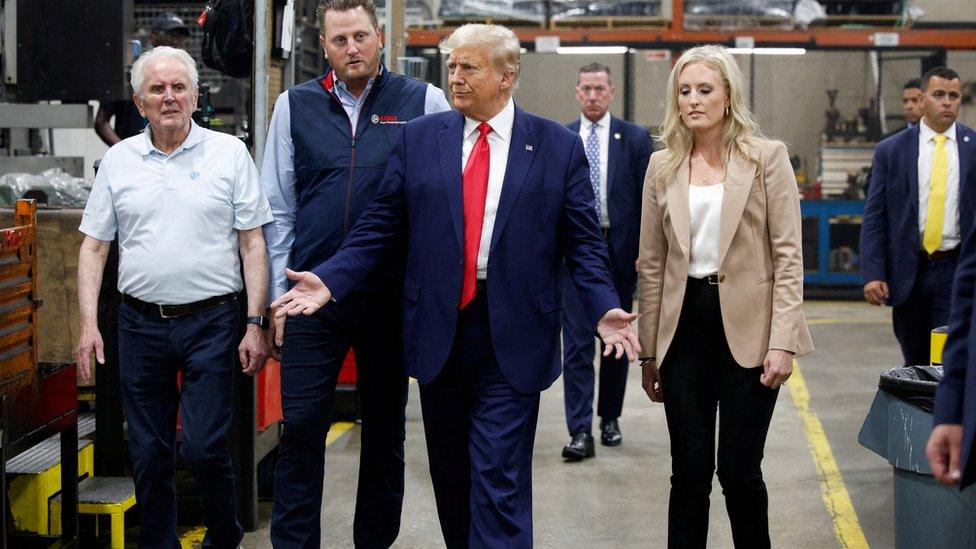
After the debate, his campaign's senior advisor sent out a statement calling for the debate organisers to "immediately put an end to any further primary debates so we can train our fire on Crooked Joe Biden and quit wasting time and money that could be going to evicting Biden from the White House".
Mr Trump's remarks in Detroit came one day after Mr Biden, in a first for a sitting president, joined a picket line with auto industry workers at the United Auto Workers (UAW) labour union's invitation.
Speaking at a non-unionised factory, the ex-president slammed his successor's push for electric vehicle production and warned workers they were "all going to be out of business".
And he repeatedly called on UAW leaders to endorse his presidential bid, telling workers to "get your union leaders to endorse me, and I'll take care of the rest".
It was an early skirmish in the battle for the blue-collar vote, and their most direct face-off so far, ahead of next year's election.
A CBS News poll conducted earlier this month found Mr Trump beating Mr Biden by one point in a rematch of their 2020 head-to-head.
Republican voters will begin choosing their candidate in state-by-state contests in January, with the first taking place in Iowa.
The winner will be formally crowned at the party convention in Milwaukee in July and go on to the general election less than four months later.
- Published28 September 2023
- Published21 January 2024
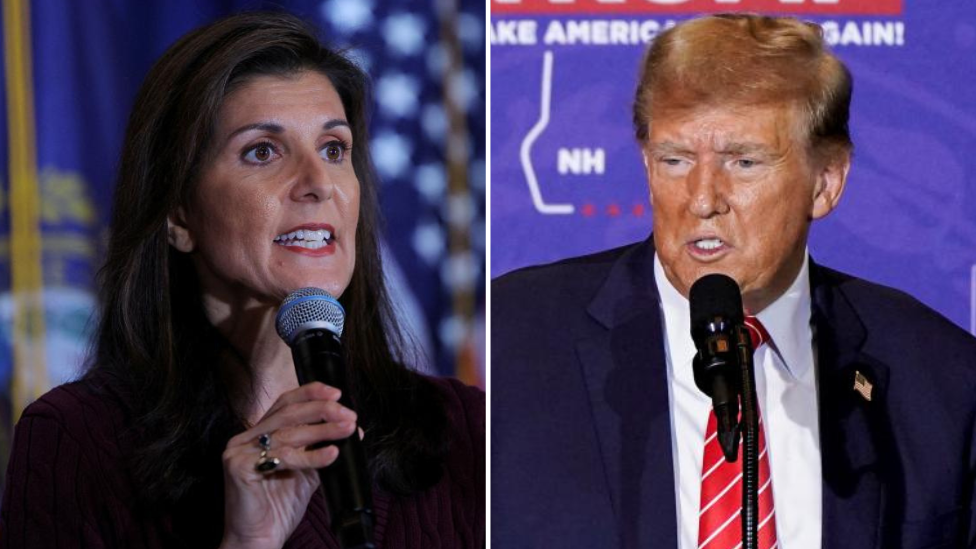
- Published28 September 2023
